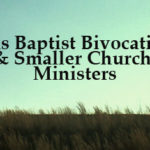DALLAS—A new law will benefit operators and participants in church retirement plans, according to leaders of GuideStone Financial Services, the Baptist clergy benefits agency.
Provisions of the Protecting Americans from Tax Hikes Act of 2015, called the PATH Act, will allow church retirement plans to include automatic enrollment features in their retirement programs, regardless of state wage withholding laws. It also will allow for some transfers and mergers between accounts of the same employer.
Additionally, provisions that regulate how employees are counted for benefit purposes will help distinguish between different kinds of church and denominational governance structures.
The legislation—sought by a coalition of denominational retirement plan providers—took three Congresses to consider before being tacked onto the PATH Act in December 2015. President Barack Obama signed the bill into law Dec. 18.
“This bill has been a long-awaited and hard-fought bill to pass,” GuideStone President O.S. Hawkins said. “We appreciate all who made this bill a reality.”
A major “win” in this new legislation is leveling the playing field between secular employers’ plans and church-related employers’ plans regarding automatic enrollment. A component in the law pre-empts state laws that interfere with the ability of a church plan to offer automatic enrollment programs. Under such programs, employees automatically enroll in the retirement plans at a preset level of deferrals. Employees have the option to opt out or make changes to the amount deferred, and some notice requirements must be met.
Congress made a similar provision affecting for-profit organizations’ 401(k) employer-sponsored plans in the Pension Protection Act of 2006. But it had not expressly included non-profits’ 403(b) plans, leading some to believe state wage-garnishment laws might impact the ability to enroll workers automatically into a 403(b) plan.
According to the U.S. Department of Labor, up to 30 percent of eligible workers choose not to participate in an employer’s retirement plan. Less than 15 percent of eligible workers opt out of an automatic enrollment plan.
“Benefit decisions can be overwhelming,” said Joy Roberts, executive director of retirement relationship management at GuideStone. “New employees are asked to make impactful decisions about their retirement plan at the same time they are starting a new job. Many delay getting started or don’t contribute adequately.
Sign up for our weekly edition and get all our headlines in your inbox on Thursdays
“This new legislation will give employers the option to automatically enroll their employees, giving their employees greater financial security in their retirement and making sure that their employees are accessing the full scope of benefits that help retain great employees.”
The PATH Act was known as the “taxibus” bill Congress passed to keep the government running through the 2016 budget year. Sens. Ben Cardin, D-Md., and Rob Portman, R-Ohio, along with Reps. Pat Tiberi, R-Ohio, and Richard E. Neal, D-Mass., cosponsored the church retirement plan portion of the PATH Act.













We seek to connect God’s story and God’s people around the world. To learn more about God’s story, click here.
Send comments and feedback to Eric Black, our editor. For comments to be published, please specify “letter to the editor.” Maximum length for publication is 300 words.